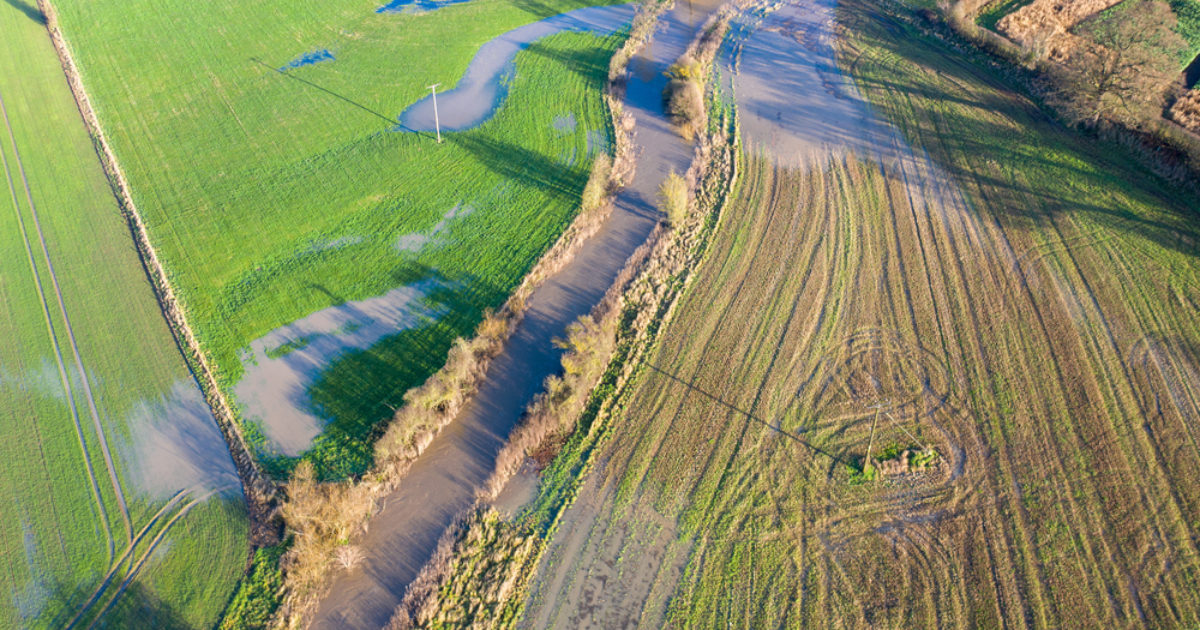Last updated:
07 Oct. 2025
New analysis [1] by the Energy and Climate Intelligence Unit (ECIU) of UK harvest data suggests that extreme weather so far in the 2020s has played a major role in creating a total deficit in wheat production of over seven million tonnes. When considering the proportion [2] of UK production used for milling flour, this is enough wheat to bake over four billion loaves of bread.
With a population of 69 million people, this equates to 64 loaves of bread for every person in the UK, over a year’s supply [3]. The analysis just looked at harvest data between 2020 and 2024. With another poor harvest forecast for 2025 after a record breaking hot and dry spring [4] and summer [5], it is likely that this deficit will worsen further, making the UK more dependent on imports.
Tom Lancaster, land, food and farming analyst at the Energy and Climate Intelligence Unit (ECIU) said:
“This decade has already seen some of the worst harvests on record after extreme rainfall made it impossible for farmers to drill and manage crops. And this year we’ve seen the opposite as crops suffered in the hottest and one of the driest springs and summers on record.
“This is what farming in a changing climate looks like. Extreme weather is making our bread less British, as millers have to turn to imports due to shortfalls in UK production, costing British farmers billions in lost income and reducing our self-sufficiency in our main, staple crop. Although we can do more to support our farmers to adapt to these extremes, only reducing planet warming emissions to net zero can prevent these losses to extreme weather escalating in the years to come.”
Two of the three worst harvests on record have occurred this decade after extreme wet weather, with the worst in 2020 and third worst in 2024. Wetter, warmer winters are consistent with climate projections, and extreme rainfall in 2023/24 was made ten times more likely by climate change, with storm rainfall 20% heavier [6]. This disrupted farmers ability to drill crops and hit yields. Similar conditions prevailed in winter 2019/20, which at the time was the fifth wettest on record, with the wettest February on record [7].
In order to make up the shortfall in UK production, millers have had to import record levels of wheat to mill flour for bread, cakes and biscuits. In autumn last year imports of wheat were double the five-year average [8] as UK self-sufficiency in wheat collapsed from 96% in 2023 to 79% in 2024 [9].
Colin Chappell, an arable farmer from Lincolnshire [10] said, “I have never known a more challenging time to farm. As a farmer, I am used to managing the worst the weather has to throw at me, but recent years have become impossible. Months of rainfall are followed by months of drought, seemingly without a break, and I am now facing a second terrible harvest in succession.
“I need more support to be able to adapt to these extremes and build the resilience of my business, but with the green farming schemes here in England closed, that support isn’t open to me. Getting them open has to be a priority if farmers are to be able to continue to grow wheat and other key crops for the Great British public.”
The ECIU analysis suggests that volatility in this decade has become increasingly unmanageable. Volatile weather is a feature of farming, and farmers and food producers are used to ironing out the bad years with the good. Looking back to wheat harvests since 2005 [11], good years were enough to offset the bad in the five-year periods between 2005-2009, 2010-2014 and 2015-19, with a surplus in each of these periods compared to the twenty-year average between 2005-2024.
Between 2020-2024 however, harvests were below the twenty-year average in four out of five years, pulling down this average overall. A good arable harvest in 2022 was not enough to offset marginally below average harvests in 2021 and 2023, and terrible harvests in 2020 and 2024 after extreme heavy rainfall. With some estimates [12] suggesting that the UK is on course for another poor harvest due to record dry and hot weather this year, the country again faces a major deficit in wheat.
Based on current yield estimates [13] from the Agriculture and Horticulture Development Board (AHDB) and crop area estimates [14], the UK wheat harvest could be down by nearly 2 million tonnes compared to the twenty-year average for 2005-2024. Assuming around two fifths of this would go to milling, this would equate to enough wheat to have baked 18 loaves of bread for everyone in the UK.
Notes to editors:
1. The analysis is available here: https://eciu.net/analysis/reports/2025/the-impact-of-poor-harvests-on-the-supply-of-milling-wheat
2. Of all wheat used in the UK (home grown and imported), an average of 41.6% has been milled for flour over the previous three years. For the purposes of this analysis, we assume this proportion of the overall shortfall in wheat production that we estimate will have gone to milling.
3. UK Flour Millers estimate that 60.3 loaves of bread are purchased per person per year. This will not equate to consumption as a proportion of this will be wasted, https://www.ukflourmillers.org/knowledge-hub/market-insights/flour-bread-consumption
6. Autumn and winter storm rainfall in the UK and Ireland was made about 20% heavier by human-caused climate change, https://www.worldweatherattribution.org/autumn-and-winter-storms-over-uk-and-ireland-are-becoming-wetter-due-to-climate-change/
7. Carbon Brief: https://www.carbonbrief.org/met-office-the-uks-wet-and-warm-winter-of-2019-20/
8. AHDBhttps://ahdb.org.uk/news/firm-maize-and-wheat-imports-so-far-grain-market-daily
10. Colin Chappell farms in North Lincolnshire, and is a member of the Nature Friendly Farming Network (NFFN). Depending on availability, he is available for further comment and interview.
11. 2005 was selected as the start year as prior to this agricultural subsidies were linked to production, which led to artificially high levels of production. The period since 2005 is a closer reflection of production in line with market demand.
13. AHDB: https://ahdb.org.uk/cereals-oilseeds/gb-harvest-progress
14. AHDB: https://ahdb.org.uk/cereals-oilseeds/planting-variety-survey-results
For more information or for interview requests:
George Smeeton, Head of Communications, ECIU, Tel: 07894 571 153, email: george.smeeton@eciu.net

